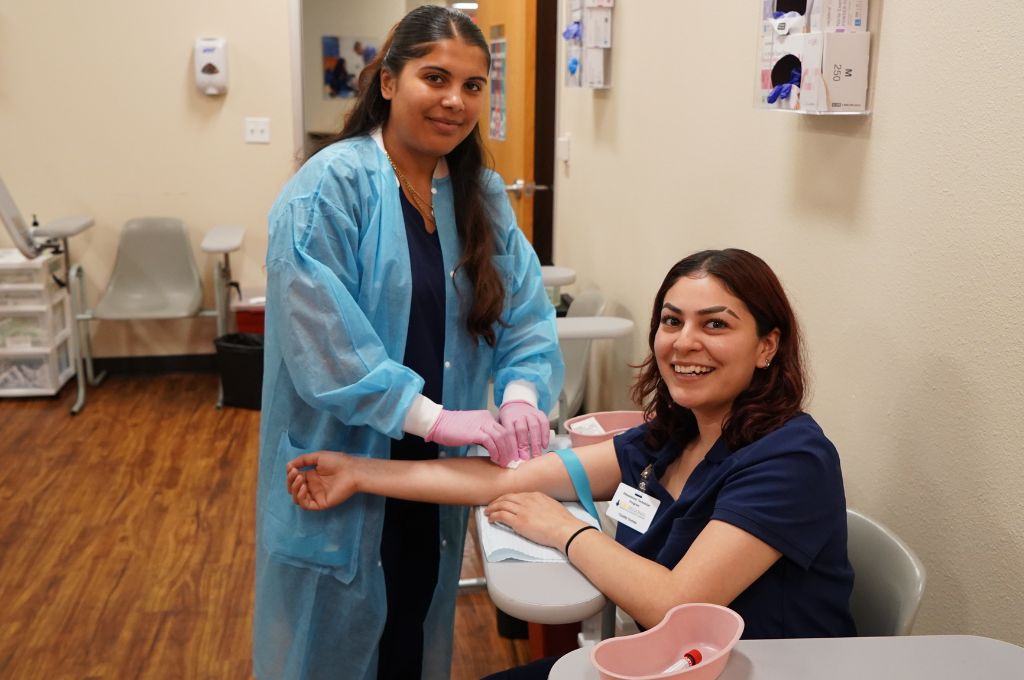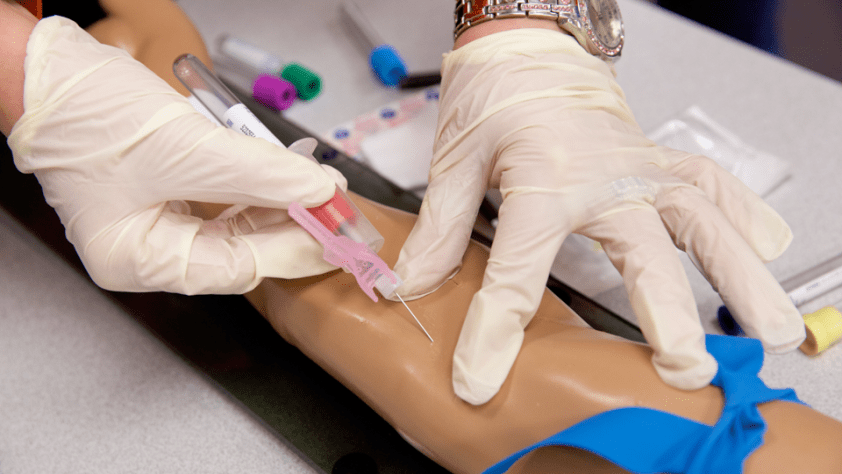Comparing Phlebotomy Courses Near Me That Match Your Budget
Comparing Phlebotomy Courses Near Me That Match Your Budget
Blog Article
The Course to Qualification: Understanding the Phlebotomy Training Training Course Trip and Its Value
As you think about the path to qualification in phlebotomy, it's vital to comprehend the role you'll play in health care. Your training will certainly cover important skills, from blood collection strategies to patient communication.

The Function of Phlebotomists in Healthcare
Phlebotomists play a necessary role in the healthcare system, functioning as the essential web link in between people and vital diagnostic screening. You'll carry out blood draws, making sure samples are collected accurately and securely. Your knowledge aids in detecting clinical conditions, keeping an eye on health and wellness, and assisting treatment choices.
In your everyday communications, you'll require to establish trust with individuals, making them really feel comfy during what could be a difficult experience. You're liable for classifying and managing samples carefully to stop contamination or errors, which can influence examination results.
Beyond this, you'll frequently work alongside medical professionals and nurses, interacting vital details concerning patients' conditions. Your duty is basic in preserving the process in health care settings, ensuring timely and exact results. By mastering your abilities, you contribute meaningfully to individual treatment, making you an indispensable component of the medical team. Embracing this responsibility is crucial to your success as a phlebotomist.
Introduction of Phlebotomy Training Programs
When discovering phlebotomy training programs, you'll locate numerous kinds created to fit different timetables and finding out styles. Each program helps you create necessary abilities like blood collection and person interaction. Comprehending these options is crucial to selecting the ideal course for your career.
Kinds Of Training Programs
Numerous kinds of training programs are readily available for those looking to come to be competent in phlebotomy. In addition, some health centers and centers supply on-the-job training programs, supplying sensible experience while you learn. Whatever course you select, each program intends to outfit you with the needed skills for a successful phlebotomy career.

Secret Abilities Created
Mastering phlebotomy calls for a collection of crucial abilities that are created via detailed training programs. You'll discover technical skills like appropriate capillary selection, needle insertion, and blood collection strategies. These hands-on methods assure you can perform treatments safely and effectively. Furthermore, interaction skills are fundamental; you'll require to communicate with individuals, discuss treatments, and placed them secure. Comprehending composition and physiology is critical, also, as it assists you situate veins and comprehend the body's feedback to blood draws. You'll gain knowledge of safety protocols and infection control, guaranteeing you preserve a clean and sterile environment. Each of these abilities is important for your success as a licensed phlebotomist, making you a useful asset in any kind of health care setting.
Key Components of a Phlebotomy Training Course
In a phlebotomy program, you'll concentrate on vital subjects that lay the foundation for your future profession. You'll participate in hands-on training that enables you to apply what you have actually found out in real-world setups. Both the core curriculum and useful experience are vital for your success as a phlebotomist.
Core Educational Program Summary
While pursuing a phlebotomy training program, you'll run into a curriculum made to outfit you with essential skills and knowledge. Phlebotomy Courses Near Me. This educational program generally consists of composition and physiology, focusing on the blood circulation system and recognizing blood components. You'll additionally learn more about different types of blood collection techniques, including venipuncture and capillary puncture methods
Additionally, infection control and safety and security procedures are vital parts, guaranteeing you understand just how to maintain a sterilized environment. You'll examine patient interaction, emphasizing communication and compassion, which are essential for reducing client stress and anxiety. Finally, honest and lawful considerations will certainly be dealt with, preparing you for real-world obligations. This foundational knowledge will enable you to stand out as a phlebotomist and supply quality care in medical settings.
Hands-On Training Experience
Getting hands-on experience is a crucial component of your phlebotomy training course. This useful training enables you to apply what you've found out in a real-world setting, enhancing your abilities and confidence. Phlebotomy Courses Near Me.
In addition, you'll obtain click this link the chance to connect with people, which is essential for establishing your communication abilities. This combination of technical proficiency and interpersonal skills is important for your success as a certified phlebotomist. Eventually, hands-on training is where theory fulfills technique, strengthening your expertise and readiness for qualification.
Accreditation and Licensing Needs
Prior to you can begin your career in phlebotomy, it is important to understand the certification and licensing requirements that vary by state. A lot of states call for phlebotomists to hold an accreditation from a recognized organization, such as the National Phlebotomy Organization or the American Culture for Medical Pathology. These certifications usually entail passing a test that evaluates your understanding and abilities in the field.
In enhancement to certification, some states have particular licensing requirements. You may require to finish a certain number of hours in medical method, submit evidence of training, or go through a history check. It is necessary to investigate your state's regulations to make certain you meet all essential criteria.
Remaining notified concerning these needs not just aids you secure a placement but additionally boosts your trustworthiness as a professional. By meeting these requirements, you'll be well on your means to a successful job in phlebotomy.
Hands-On Training and Practical Experience
Hands-on training and useful experience are vital elements of your phlebotomy education, as they permit you to use academic expertise in real-world situations. During your training, you'll engage in monitored venipuncture, find out proper techniques, and come to be accustomed to various blood collection devices. This straight participation is important for building your self-confidence and developing your skills.
You'll work very closely with skilled experts that can lead you with the nuances of individual interaction and sample handling. Each session not only reinforces your understanding but likewise prepares you for the hectic atmosphere of healthcare settings.
Furthermore, several programs incorporate professional rotations, enabling you to experience diverse setups, from medical facilities to outpatient facilities. This direct exposure helps you adapt to various challenges and person demands, ensuring you're well-prepared for your future duty. Welcome these possibilities, as they're vital to becoming an experienced and caring phlebotomist.
Difficulties Dealt With Throughout Training
While acquiring hands-on experience is vital, it is essential to recognize the challenges that can develop during your phlebotomy training. You could encounter anxiety when carrying out treatments on actual individuals, browse around this site particularly if you're brand-new to the environment. The pressure to get everything right can be overwhelming. Additionally, mastering the skills required for blood attracts takes technique; you might deal with method at first.
Time administration can likewise be an obstacle, as balancing concept, practical sessions, and individual commitments can really feel intimidating. You may deal with varying learning rates among your peers, bring about feelings of self-doubt if you believe you're falling behind. Ultimately, adapting to the different characters of instructors can be tough, as each might imp source have a distinct teaching design.
Acknowledging these challenges early on can prepare you for success and help you establish resilience throughout your training trip.
Profession Opportunities After Certification

As you obtain experience, you might even take into consideration specializing in areas like pediatric or geriatric phlebotomy, satisfying details client needs. Some phlebotomists select to advance their careers by coming to be lab service technicians or going after further education in health care fields.
In addition, your qualification can lead to functions in training or managing new phlebotomists, enabling you to share your knowledge. With the health care industry constantly growing, your skills will certainly constantly remain in demand, paving the means for a secure and meeting profession. Accept the possibilities waiting for you!
Frequently Asked Inquiries
What Is the Common Period of a Phlebotomy Educating Training Course?
Phlebotomy training programs usually last around four to 8 weeks. You'll take part in hands-on practice, classroom instruction, and on-line learning. Finishing this training prepares you for qualification and a rewarding career in healthcare.
Are Online Phlebotomy Courses Available?
Yes, on-line phlebotomy training courses are readily available. They supply adaptability and ease, permitting you to research at your very own rate. Simply verify the program is recognized to meet accreditation needs and acquire valuable abilities for your career.
How Much Does Phlebotomy Training Generally Price?
Phlebotomy training typically costs in between $700 and $2,500, depending upon the program and location. You must consider elements like training course size, included products, and hands-on experience when picking the appropriate training for you.
What Are Common Requirements for Phlebotomy Training?
Usual prerequisites for phlebotomy training often include a senior high school diploma or GED, immunizations, and a history check. Some programs may also need fundamental health care understanding or qualifications, ensuring you're gotten ready for hands-on training.
Can I Work While Finishing My Phlebotomy Training?
Yes, you can work while finishing your phlebotomy training. Several pupils equilibrium work with their studies, however make specific to handle your time successfully to guarantee you meet both work and training dedications successfully.
Report this page